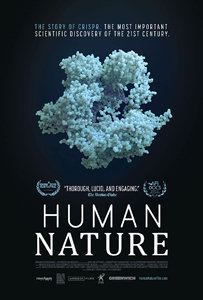 Human Nature (2019)
Human Nature (2019)
If you have never heard of the gene-editing tool called CRISPR, or you have heard of it and wondered what all the fuss is about, I strongly encourage you to watch this excellent documentary film (on Netflix). When the prestigious journal Science published an article by the Berkeley biochemist Jennifer Doudna about CRISPR back on June 27, 2012, the scientific community took note. CRISPR was a new tool that enabled scientists to edit the DNA of plants and animals. Many people have compared it to the delete-n-replace function in Microsoft Word. It's no exaggeration to say that CRISPR is one of the most revolutionary developments in the entire history of biology. And as many people predicted, Doudna and her colleague Emmanuelle Charpentier eventually shared the Nobel Prize for their pioneering work. Furthermore, CRISPR is not only simple, fast, and cheap, it is an incredibly powerful tool that can be used for both good and ill, from preventing or curing dreadful diseases like sickle cell anemia to making enhanced designer babies. In the film, Doudna shares her infamous "OMG moment" when, soon after discovering CRISPR, she had a nightmare in which a famous scientist came to her and said, "I have somebody very powerful with me who I want you to meet, and I want you to explain to him how this amazing technology functions. So I said, sure, who is it? It was Adolf Hitler wearing a pig's face."
The movie is a bit dated in one important regard that is mentioned at the very end. On November 25, 2018, a bombshell of a story broke about how a rogue Chinese scientist named He Jiankui had used CRISPR to edit the DNA of two human embryos, which about a month earlier in October had resulted in the birth of nonidentical twin girls. These twins were the first "gene-edited humans" that we know of. And since this was what is called "germline editing," the changes that were made to the DNA of the twins could be passed on to their descendants. The consensus of the international science community to the Jiankui story was immediate and nearly unanimous. For Hank Greely, a Professor of Law and Director of the Stanford Center for Law and the Biosciences at Stanford University, the development was "a cross between bad fiction and reckless fiasco." It was "grossly reckless, irresponsible, immoral, [and] illegal." When Doudna learned about He's experiment, she says that she was "just horrified; I felt kind of physically sick." Francis Collins, director of the NIH, described it as "profoundly disturbing." A joint statement of 122 Chinese scientists called it "madness." In fact, on December 30, 2019, the Chinese government tried Jiankui and sentenced him (and two colleagues) to three years in jail. It also fined him $430,000. No one knows where Jiankui is now, nor have scientists heard from him since.
For more on this important subject see the books by Henry T. Greely, CRISPR People: The Science and Ethics of Editing Humans (2021); Jennifer Doudna, A Crack in Creation: Gene Editing and the Unthinkable Power to Control Evolution (2017); and the new biography by Walter Isaacson, The Code Breaker: Jennifer Doudna, Gene Editing, and the Future of the Human Race (2021); and then the Netflix movie Unnatural Selection (2019), which is about the uses and abuses of CRISPR.
Dan Clendenin: dan@journeywithjesus.net


